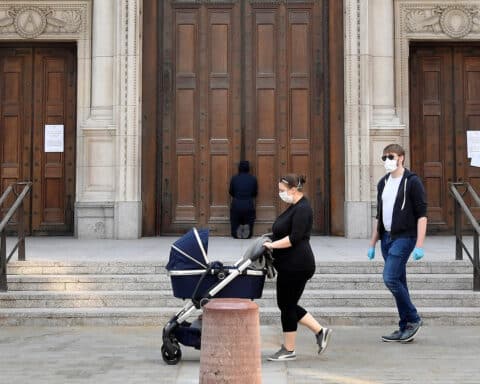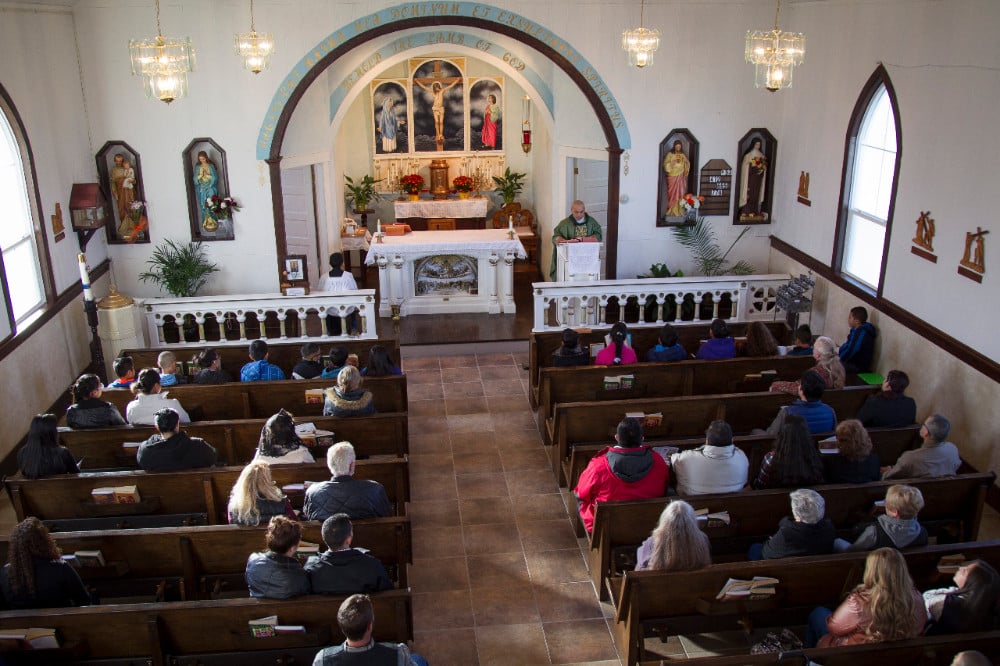When I was 14, I began working in my father’s dry goods store. One of the first lessons he taught me, as I waited on customers, was one of welcome. He said: “Bob, people shopping in the store do not have to come here. There are more stores down the street. We need their business and must treat them as guests. Remember that everyone who visits our store is our guest. Give them the kind of welcome a guest deserves.”
I never forgot his words. They have served me well throughout my life, such as when dealing with people in the parish or teaching classes. Make them feel welcome as guests, and they will respond accordingly.
When we develop a welcoming attitude, people become comfortable around us and are open to what we say. This is essential for Christian discipleship.
While on earth, Jesus treated people in a welcoming way. Those he met became his guests. Still today, he continues to invite people into his kingdom through the welcome that we, members of his body, extend to them. Christians are to open their hands and hearts and welcome others as guests of the Lord.
Interpersonal awareness is the starting point for a Christian disciple. This is challenged today by the impersonalism of our times, which puts material things before people.
This issue was exacerbated two years ago when the COVID-19 pandemic hit, which has made it difficult to engage in interpersonal actions because of the distancing required to prevent the spread of the virus.
To live a happy life, we crave affection, care and comfort in addition to food, assistance, shelter and protection. During the pandemic, close contact with family and friends was limited. An occasion after returning home from the grocery store comes to mind.
As I stood in the driveway, wiping the grit from my car window that made it hard for me to see, the mailman stopped his truck in front of my house, picked up my mail and walked toward me.
He smiled broadly and offered me the mail, thus saving me a trip to the mailbox. As he did so, neither of us was wearing a face mask. Instinctively, I put up my hand, signaling him to stop.
I asked him to put the mail on the trunk of my car. His smile disappeared as he returned to his truck. My “thank you” was a cold response to his friendly gesture; it was not how I treated people before the pandemic.
This episode is not intended to criticize those who maintain social distance. Rather, it invites us to reflect on our personal responses during the pandemic and whether they changed after we began wearing masks.
Masks symbolize the challenges to interpersonal living for Christian disciples in society amid the current pandemic. They are also a jumping-off point to consider the following: Christian disciples as incarnational people; how Christian disciples choose people over things; Christian disciples and the digital social network; Christian disciples in the making; and Christian disciples formed in the family.
As we approach two years living amid a pandemic, let’s look at these themes of what a Christian disciple should be and how we can refocus this element of our faith amid difficult times.

1. Christian disciples as incarnational people
Christian disciples are incarnational people, for God dwells within us. As Jesus says, “For behold, the kingdom of God is among you” (Lk 17:21). The resurrected Christ is active in us through our personal responses.
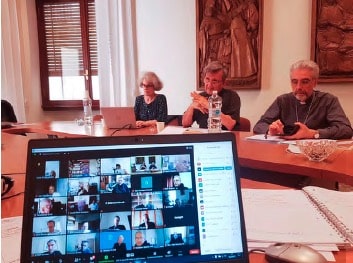
We convey Jesus’ message through our dealings with families, friends and co-workers. A welcoming parish does the same when parishioners gather to celebrate Mass, listen to the Scriptures and receive the Eucharist.
But when the pandemic began in 2020, our interpersonal actions took a hit. We avoided crowds and practiced social distancing. We closed our churches. When they reopened, at-risk parishioners were urged to stay home, and those who came to Mass did so in a sterile environment.
Fewer people came, less interaction occurred, holy Communion from the cup stopped, and parishes were more cautious about everything. Distance between pews replaced welcoming and worshiping as a close-knit community, sanitizers replaced holy water, and social distancing replaced the sign of peace. Masks symbolized the need to keep our distance from one another, as personal relations were seriously tested in our parishes. Relating to others in a church became more like attending a functional gathering rather than an interpersonal community.
During this time, we communicated differently, manifested by the explosion of new modes of internet communication, including livestreamed TV Masses and business and church meetings on Zoom.
Challenges also presented themselves for those attending Mass on the internet. While some preferred celebrating the Eucharist this way — especially if they discovered online a Eucharistic celebration coming from another parish where the music and preaching were better than at their parish — many others who participated in Mass by watching it online said they missed receiving holy Communion and participating in the interpersonal, communal dimension of the Mass. When not present physically for Mass, they found it more difficult to appreciate that the Eucharist is the ongoing repetition of Jesus’ suffering and death made present on our altars in an unbloody way.
This time also affected family life, as many grandparents did not see their grandchildren for extended periods of time, nursing homes closed their doors to relatives and friends, children attended school via online learning, and many people lived in near isolation.
At present, Christian disciples cannot throw caution to the wind, but we need to reflect on how we communicate with one another. In so doing, we begin with our priority of people over things.
| Questions to ask |
|---|
“Let all guests who arrive be received like Christ, for he is going to say: I was a stranger and you welcomed me.” |
2. Christian disciples choose people over things
Our reflection on discipleship begins by examining the materialistic priorities of our secular culture that inundate us and influence our communication. The pandemic affords us the opportunity to refocus these priorities. To do so, we remember Jesus’ words: “What profit would there be for one to gain the whole world and forfeit his life?” (Mt 16:26).
During the pandemic, many people lost their jobs and income. This brought strife, especially among the poor and disenfranchised, but it also gave them the opportunity to examine their priorities.
Parishes also suffered financial loss, leading to all sorts of disruptions. As revenue declined, yearning for the interpersonal deepened. This invited us to focus on spiritual priorities, centered on God’s grace. At the same time, our desire for more than material satisfaction indicates that the personal takes precedence over the secular.
In spite of the hardships that the pandemic brought, secular society continually urges us to give priority to functional matters at the expense of the love and compassion manifested in healthy relationships. In contrast, Pope St. John Paul II challenged the priorities of a capitalistic system when speaking of the “worker” and “his or her work” in his encyclical Laborem Exercens (“On Human Labor”). Here, the pope stresses that the worker must always take precedence over the work, for the worker is made in the image of God.
Capitalism often reverses this order and gives priority to what is produced (work) instead of the person who produces it. The pope’s words are applicable to our secular society where material things often have priority over those who make them.
During the pandemic, many men and women worked from their homes instead of their offices. Often, this allows for flexibility, making it easier to work according to “their time” instead of the “company’s time.” But it also presented a challenge. What happens when those working from home no longer relate personally with co-workers or interact with colleagues? How does this affect their emotional life? What effect does it have on them when those working from their homes are alone for long periods of time, except for brief dealings with family and friends? Does this lifestyle inhibit interpersonal communication within their families, or does it enable them to get along better with their spouses, siblings and children? Do family relationships deepen or become more functional? If the pandemic gives us more personal time, why are many people angry and stressed out?
Whether the pandemic will help us focus on the personal is an open question. It is clear, however, that how Christian disciples communicate in their homes will affect us in the future — sometimes to our benefit, other times to our detriment.
| Questions to ask |
|---|
“Work constitutes a foundation for the formation of family life, which is a natural right and something that man is called to. These two spheres of values-one linked to work and the other consequent on the family nature of human life-must be properly united and must properly permeate each other.” |
3. Christian disciples and the digital social network
Love is deeper than being personally present with those we love. While imprisoned in a World War II concentration camp, Viktor Frankl, in “Man’s Search for Meaning,” describes his love for his wife. Even though he did not know whether she was alive or dead, his love for her continued to deepen.

When not physically present with our loved ones, our love can grow, for love is deeper than physical presence. This also applies to our love of an unseen God, who makes love possible.
Once we realize that physical distance does not deter love, we can learn to express it by using internet digital platforms. When done appropriately, these can deepen our love. Acknowledging love’s complexity and reflecting on the different ways that interpersonal love is manifested opens the door that connects the personal with the digital.
Social media offers us new ways to express communal relationships when we are not physically present. The digital communities, engendered through social platforms, are real communities, different from the ordinary interpersonal ones we normally experience.
This is apparent in how younger generations of technology users communicate with one another in digital communities. There they befriend strangers and relatives who provide support systems and afford opportunities to express love and affection.
Digital communities offer legitimate ways to grow in love and relate interpersonally. Being with a person in this way is not the same as being in her or his personal presence, but it is, nevertheless, a real form of community. And while this mode of interpersonal communication is powerful, it’s dangerous if misused. A new world exists for those who communicate this way, thus taking their rightful place in forming interpersonal relationships.
Using an expression, coined by Martin Buber, we enhance our “I-thou” relations with internet encounters, as we join with others in deepening the mystery of interpersonal love. From a faith perspective, digital communication helps us grow in our “I-Thou” relations.
| Questions to ask |
|---|
“It is in commitment to the Church’s universal mission that the new evangelization of Christian peoples will find inspiration and support. … I sense that the moment has come to commit all of the Church’s energies to a new evangelization and to the mission ad gentes. No believer in Christ, no institution of the Church can avoid this supreme duty: to proclaim Christ to all peoples. |
4. Christian disciples in the making
Before Jesus began his public ministry, he went to the desert to fast and pray for 40 days. At various times in his life, when tired or exhausted, he got away from the crowds.
Like Jesus in the desert, we changed our usual routine during the pandemic. Prior to it, taking time to reflect on interpersonal and digital communication was difficult. We were busy at work, in our homes, with children or elderly parents, or in keeping up with multiple responsibilities.
After the pandemic hit, children stayed home from school. Many adults worked at home, everyone wore masks, we avoided going into stores and communicated by phone, text messages and Zoom. We had time to reconsider our options. Some people changed or quit their jobs. Others stopped going to Mass and prayed with others on digital platforms. Still others wondered whether life would be the same again. Just as Jesus entered a troubled world to begin his ministry, we struggled to find ourselves in uncertain times. We, too, asked what being a disciple of Christ meant.
In doing so, we discovered that being a Christian disciple in the secular desert, where we live, means using every possible means, including digital platforms, to follow Christ’s way. We do this when we bring God’s love to the healthy and hurting alike by our personal presence and by using the digital means available to us.
Today’s disciple lives in an interlocking world of interpersonal relationships, complemented by ever-developing forms of technology. In addition to direct personal contact with our families, work associates and others, technology invites us to keep in touch with loved ones through the internet, telephone and digital platforms.
This means establishing close faith associations with our families and parish members. In so doing, interpersonal bonds of faith begun at home are reinforced in our parishes, deepened in our schools, and enhanced through digital communications.
As this happens, the interpersonal takes on a new shape, as communication between people physically present to us interfaces with digital communications. Solidifying this interface challenges Christian disciples to see, act and evangelize in a new way.
| Questions to ask |
|---|
“Even amid the ‘busy-ness’ and the stress of our daily lives, we need to make space for silence, because it is in silence that we find God, and in silence that we discover our true self. And in discovering our true self, we discover the particular vocation which God has given us for the building up of his Church and the redemption of our world.” |
5. Christian disciples formed in the family
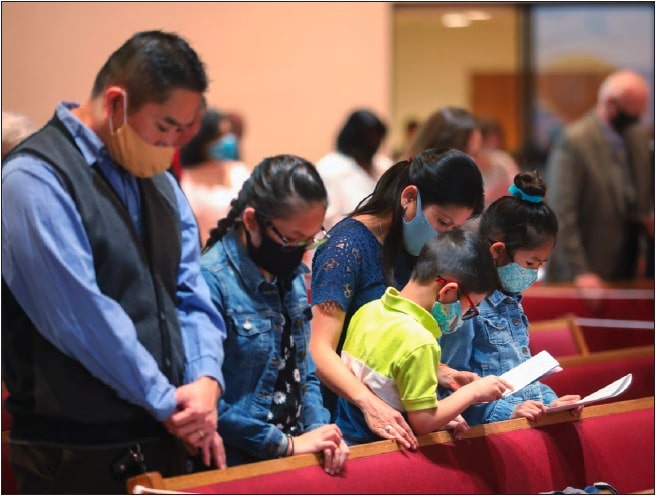
We first experience in a nonverbal way welcome into this world through the actions of others, especially our parents. While still in the womb and soon thereafter, a child senses that he or she is wanted or rejected. This happens through what psychologist Gordon W. Allport calls “affiliation,” meaning “unity in close contact.”
This article began by describing how my father taught me to be a welcoming person and to regard customers as guests. I first learned this by his good example and from the love of my mother, long before I put into words the love that they shared with me.
Sensing welcome in this way helped me appreciate why every family member, often in different ways, needs to feel welcome in the family and to take the love experienced there into the world.
Love, first manifested in family relationships, is extended into the neighborhood, workplace and parish. What we learn at home, we share in the larger society where we live. Just as Jesus experienced love in the holy house of Nazareth, so through the care for others, we become a welcoming person by treating everyone we meet as a guest.
Beset with unrest on all sides, we also recognize that living as a Christian disciple means bringing Jesus’ love and compassion to people by intentionally pursuing our call to follow Christ. Supported by the Christian community, our attitude must be that of Christ. Whether in a family, a parish or across the world, the first step to living out Jesus’ call to discipleship is “to follow him” by sharing the Good News that he offers us.
| QUESTIONS TO CONSIDER |
|---|
“The family is, so to speak, the domestic church. In it parents should, by their word and example, be the first preachers of the faith to their children; they should encourage them in the vocation which is proper to each of them, fostering with special care vocation to a sacred state.” |
So, as near the two-year mark of the pandemic, we continue to walk in his footsteps, knowing that God loves us and that we are dependent on him. God is God, and we are humans, made in God’s image and given personal gifts for sharing God’s love with others. In doing so, we can never forget Jesus’ words, “I am with you always, until the end of the age” (Mt 28:20).
Father Robert J. Hater, Ph.D., is a priest in the Archdiocese of Cincinnati and a professor emeritus of the University of Dayton.
| Need more on discipleship? |
|---|
|
“Forming Intentional Disciples: The Path to Knowing and Following Jesus” ($17.95) by Sherry A. Weddell “Teaching for Discipleship: The Call, the Challenge, the Difference” ($8.95) by Mike Carotta, EdD Visit osvcatholicbookstore.com for these and more books! |

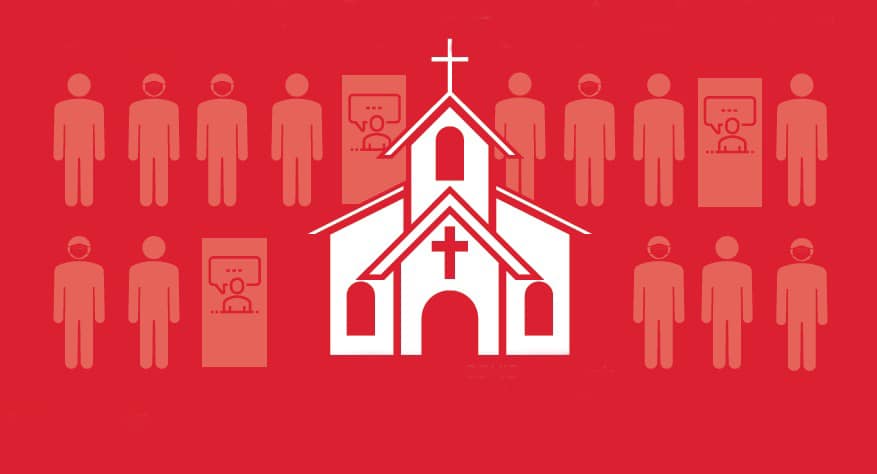
 Whether it’s teaching others or yourself about what it means to be a disciple of Christ, OSV has some resources on how to get started.
Whether it’s teaching others or yourself about what it means to be a disciple of Christ, OSV has some resources on how to get started.